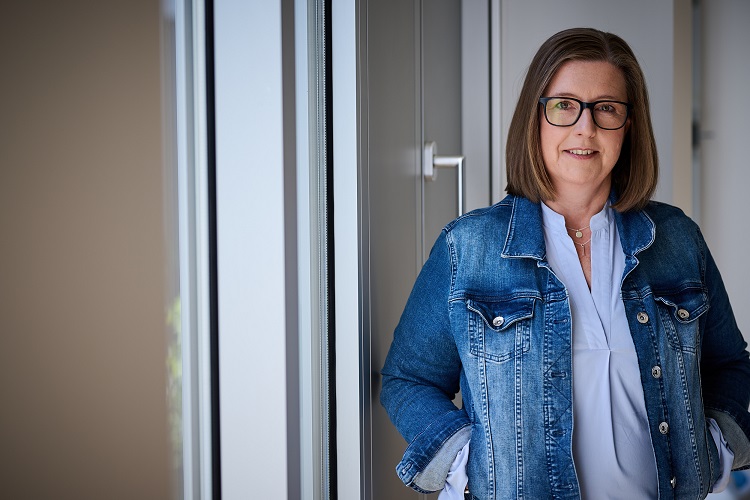
In conversation with Alexandra Schön, Senior Manager Innovation, Insights & Foresights
6. September 2023 Published by Raphael DoerrAlways keeping an eye on current megatrends: As Senior Manager Innovation, Insights & Foresights, Alexandra Schön is responsible for incorporating user needs into the product development process via elements of consumer insight research. Read here why she finds fulfillment in strategic and creative work.
Tell us something about your role at Gigaset.
As Senior Manager Innovation Insights & Foresights in the Strategy, Innovation & Design department, I am at the beginning of a product development process. For successful product development, it is essential to put the user at the center and to maintain a deep understanding of people, their needs and the realities of life. My job is to identify these user needs through consumer insight research. This means we conduct in-depth interviews, conduct social listening and carry out continuous and extensive observation of mega/consumer trends and assess their relevance for Gigaset. In the innovation team and with partners, we transform these findings into sustainable and innovative strategies as well as initial product concepts for Gigaset. I accompany the product development process until the complete handover to product management.
What do industry colleagues find unique or cool about your job?
I find myself in the privileged position of working creatively and strategically with selected partners. Researching and developing user-centered solutions together in an enthusiastic and goal-oriented team is exciting and a lot of fun. Experiencing and helping to shape how an idea or observation becomes a product is very special.
What are the biggest challenges you face in this role?
The biggest challenge is identifying the right user need at the right time. It is particularly important to continue to keep an eye on this point in the product conception process and to constantly check whether the customer benefits are still being met. Given the large number of products and solutions on offer, the key question is whether Gigaset’s investment will ultimately be realistically worthwhile.
What led you to your current role?
My background is in marketing, market research and trends. In addition, I have always followed a user-oriented approach that evaluates new innovations from more than just a technical perspective. The exploratory identification of target group needs and the holistic solutions derived from them are becoming increasingly important at Gigaset. My background therefore sustainably supports Gigaset’s customer-oriented and needs-centered product strategy.
What was your path to Gigaset?
I started in 2003 as a freelance marketing consultant at Siemens Cordless Products at the Marketing Europe headquarters. In 2008, this division was sold by Siemens to Arques Industries and then renamed Gigaset a few years later.
What do you love most about your current job?
To be allowed to be curious. To understand consumers and their needs, to observe trends and to find the right ones from a variety of information and to derive and define product or solution fields from this. Experiencing and helping to shape how an idea or observation becomes a product is very special.
How long have you been working at Gigaset – and what keeps you here?
I started as a freelance marketing manager at Siemens Cordless Products in 2003 and have been a permanent employee since 2004. How time flies. I kept coming up with new tasks, projects and challenges that were exciting for me.
Looking back on your career, what is an important risk you have taken?
I left my secure job in an advertising agency in the early 2000s to work at a start-up. Everything sounded exciting, exciting and pioneering. Until the first team meeting on my second day at work, in which the CEO announced that the financing was no longer secured. To describe it with Hildegard Knef: “From then on it went downhill.” From such experiences you take away a lot of professional and human experiences that last. The positive thing about it: a new professional path opened up. I don’t regret leaving the advertising agency back then.

What excites you most about your role?
I’ve always been interested in what really moves people. I then derived personal stories from observation. What are the needs and pain points in daily communication? What is really of value to the user? I am interested in subsequently deriving and defining product or solution areas from these findings. In the end, I help create communication solutions that really satisfy the user.
What qualities do you think are critical for today’s leaders, especially in the wake of a pandemic? How can leaders stay relevant and agile?
In addition to professional qualities such as empathy, trust in employees, flexibility and leadership responsibility, a manager should be able to make (even uncomfortable) decisions and stand by them. It is important to have trust in your employees and to recognize and promote potential.
How has the pandemic changed the way we work?
Conventional work structures such as workplaces and working hours have dissolved. We have become more flexible and adaptable. We work geographically separately, but work together in teams more closely and more agilely. Work is no longer a firmly defined space, but an environment with the help of technologies. For people who work quietly and want to concentrate, the home office is a relief and has a positive effect on the result. Distance is certainly a hurdle for creative teams, but this can be overcome with the help of visual collaboration platforms. Digitalization gives us the opportunity to work from anywhere in the world and to obtain information and further training – at any time. In my opinion, the workplace of the future will adapt to the needs and requirements of employees.
What have you learned about crisis management during your time here?
How differently managers dealt with this extraordinary situation. My experiences were very positive. Despite the spatial separation at different work locations within the team, we have moved closer together as a team and become a coordinated unit.
What makes you optimistic about the future of this industry?
As long as there are people, communication will take place at any time and in any place. We can’t not communicate. The way we communicate has changed enormously in recent years, particularly as a result of the pandemic. We will maintain this learned behavior and no longer want to miss amenities. The challenge for our industry will be to react early to the behavior of users and consumers and their needs and to shape trends at the same time.
What advice would you give to a young person just starting out in the technology industry?
Stay on the ball. Keep yourself informed. Ask around in different industries. Follow industry experts/luminaries on social media and exchange ideas with them. Stay curious and go through the world with your eyes open. The best things happen left and right of the path. Try it out and be brave.
What are you passionate about outside of work?
Traveling, reading, for beautiful things
 Comments
Comments
 en
en 







